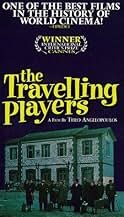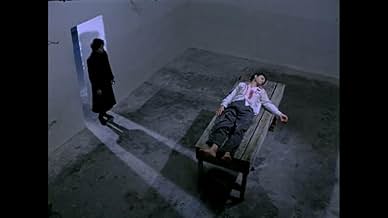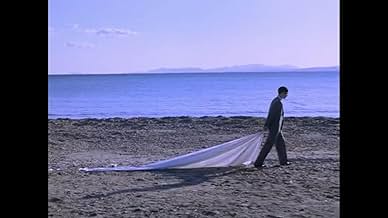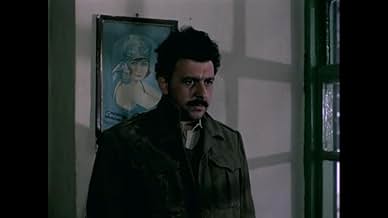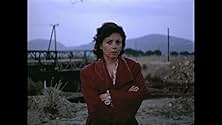AVALIAÇÃO DA IMDb
7,8/10
4,6 mil
SUA AVALIAÇÃO
Adicionar um enredo no seu idiomaGreece, 1939-1952: Fascist, Nazi, and Communist conflict, as seen through the eyes of a family of travelling provincial players.Greece, 1939-1952: Fascist, Nazi, and Communist conflict, as seen through the eyes of a family of travelling provincial players.Greece, 1939-1952: Fascist, Nazi, and Communist conflict, as seen through the eyes of a family of travelling provincial players.
- Direção
- Roteirista
- Artistas
- Prêmios
- 12 vitórias e 2 indicações no total
Avaliações em destaque
A flawed masterpiece from Angelopoulos, the first of a number of great films of his you can pick at if you want.
First and foremost, it is a technical achievement; almost 4 hours and only about 80 cuts! It goes against all we've gotten used to in film story-telling, and does it brilliantly.
The story follows a troupe of actors back and forth through the years 1939 to 1952. They're thrown about by the violent, sometimes absurd tides of Greek history, with victory over the Nazi's giving way to the rise of local fascists at home.
The film is very Brechtian and distanced in style. We hardly get to know the characters at all, despite the running time. It's much more interested in the great tides of politics and time than individuals - which is both its strength and its weakness. I was always interested, sometimes horrified, but rarely touched emotionally. Also, some of the good/bad of the politics felt simplistic.
That said, despite its length, I will re-watch it. I suspect I'll appreciate the amazing scope of it's vision and the bravery of it's style even more without expecting to get caught up in the people in a conventional way.
If you have the chance, get ahold of the 'New Star' DVD, which was only in release a short time. The transfer was supervised and approved by Angelopoulos, and certainly looks wildly better than the commonly found VHS tape.
First and foremost, it is a technical achievement; almost 4 hours and only about 80 cuts! It goes against all we've gotten used to in film story-telling, and does it brilliantly.
The story follows a troupe of actors back and forth through the years 1939 to 1952. They're thrown about by the violent, sometimes absurd tides of Greek history, with victory over the Nazi's giving way to the rise of local fascists at home.
The film is very Brechtian and distanced in style. We hardly get to know the characters at all, despite the running time. It's much more interested in the great tides of politics and time than individuals - which is both its strength and its weakness. I was always interested, sometimes horrified, but rarely touched emotionally. Also, some of the good/bad of the politics felt simplistic.
That said, despite its length, I will re-watch it. I suspect I'll appreciate the amazing scope of it's vision and the bravery of it's style even more without expecting to get caught up in the people in a conventional way.
If you have the chance, get ahold of the 'New Star' DVD, which was only in release a short time. The transfer was supervised and approved by Angelopoulos, and certainly looks wildly better than the commonly found VHS tape.
Theo Angelopoulos is one of the acknowledged masters of cinema, and yet he remains little seen: an acquired taste. It is easy to see why. Unlike other greats, like, say, Renoir and Mizoguchi, who, though firmly rooted in their own national cultures, present characters and narratives generally recognisable, Angelopoulos is forbiddingly national (as opposed to nationalistic: there are echoes of everyone from Fellini to Bunuel to Ozu in this film) in his outlook. Watching this film without any knowledge of Greek history, literature or mythology can be very frustrating - every time you see a character, event, composition, you know it alludes to something else, but because you don't know what, you feel like you're missing the point of the film. La Regle Du Jeu is enriched by a deep knowledge of French History, but can be enjoyed by anyone with an interest in cinema, stories or humanity. Angelopoulos' films don't have this surface level of entertainment - everything is symbolic and loaded.
Does this mean that the only enjoyment of the film can be a cold admiration of form? No. Even if we don't understand the specifics, we can recognise the horrors of a nation beset by continual tyranny. The metaphor of a theatrical troupe, travelling throughout Greece, is subtly used. Rather than actors, or commentators on history, as we'd expect, they're always continually observing, on the margins. Modern Greece is a labyrinth - the film is dense with streets, corridors, doors, offering no escape, just an endless loop, leading to dead ends of time and space. Fascism has exploded these notions in its denying of history and its attempt to homogenise space, and the same frame can hold events decades apart.
The travelling players are exiles in their own country. Like Bunuel's discreet diners, they can never finish their play: when they do it results in death, stagnation, and a break up of the troupe. They're bewildered like Pirandello's Six Characters, not necessarily searching for an author (they have one - Greek history), but trying to escape him. The great irony is that they cannot remain untainted by the times - one's son is a partisan, another is an informer.
Angelopoulos' use of the medium really does inspire awe. His slow, long takes, long-shot compositions and camera movements, open the mind to new conceptions of time and space, forbidden by the ideologies ruling Greece. The film is full of remarkable, shocking set-pieces; austere quiet bursting into Fellini-esque disruption; revels and song turning into murder and horror; editing so spare that each cut becomes a jolt. Songs, birds and water are the driving metaphors here: how fascism appropriates our minds, imagination and especially our voice; how our reaching for freedom is always curtailed; how history is a never-changing trampling on the vulnerable.
Angelopoulos is a modernist - he still believes in the power of witness, and the ability to assert truth, which is refreshing in these times where irony is confused with indifference. Compare THE TRAVELLING PLAYERS with Nabokov's Bend Sinister, similarly concerned with artists in a totalitarian system. Angelopoulos' systematic attempt to shore fragments against the ruins is denied by Nabokov, who bleakly suggests through fragmentation, distortion and disrupton that there is no shoring, that the only plausible rebellion is madness. Angelopoulos' view is, in many ways, more reassuring.
The film is not without its problems - a raped woman stands up to recite the rape of Greece in a queasy monologue; hateful royalists are coded homosexual to suggest sterility and death; there is, at times, a humourless self-righteousness and portentousness to the film that grates. But, before he slipped into the vague artiness of his later works, its astonishing to think that people could make films like this. In the way that you may not hold Finnegan's Wake or the Sistine Chapel to your heart, THE TRAVELLING PLAYERS is unloveable, but it's a rare experience in the cinema of the sublime. (And, believe me, once you've attuned yourself to Angelopoulos' rhythm, you won't want those four hours to end)
Does this mean that the only enjoyment of the film can be a cold admiration of form? No. Even if we don't understand the specifics, we can recognise the horrors of a nation beset by continual tyranny. The metaphor of a theatrical troupe, travelling throughout Greece, is subtly used. Rather than actors, or commentators on history, as we'd expect, they're always continually observing, on the margins. Modern Greece is a labyrinth - the film is dense with streets, corridors, doors, offering no escape, just an endless loop, leading to dead ends of time and space. Fascism has exploded these notions in its denying of history and its attempt to homogenise space, and the same frame can hold events decades apart.
The travelling players are exiles in their own country. Like Bunuel's discreet diners, they can never finish their play: when they do it results in death, stagnation, and a break up of the troupe. They're bewildered like Pirandello's Six Characters, not necessarily searching for an author (they have one - Greek history), but trying to escape him. The great irony is that they cannot remain untainted by the times - one's son is a partisan, another is an informer.
Angelopoulos' use of the medium really does inspire awe. His slow, long takes, long-shot compositions and camera movements, open the mind to new conceptions of time and space, forbidden by the ideologies ruling Greece. The film is full of remarkable, shocking set-pieces; austere quiet bursting into Fellini-esque disruption; revels and song turning into murder and horror; editing so spare that each cut becomes a jolt. Songs, birds and water are the driving metaphors here: how fascism appropriates our minds, imagination and especially our voice; how our reaching for freedom is always curtailed; how history is a never-changing trampling on the vulnerable.
Angelopoulos is a modernist - he still believes in the power of witness, and the ability to assert truth, which is refreshing in these times where irony is confused with indifference. Compare THE TRAVELLING PLAYERS with Nabokov's Bend Sinister, similarly concerned with artists in a totalitarian system. Angelopoulos' systematic attempt to shore fragments against the ruins is denied by Nabokov, who bleakly suggests through fragmentation, distortion and disrupton that there is no shoring, that the only plausible rebellion is madness. Angelopoulos' view is, in many ways, more reassuring.
The film is not without its problems - a raped woman stands up to recite the rape of Greece in a queasy monologue; hateful royalists are coded homosexual to suggest sterility and death; there is, at times, a humourless self-righteousness and portentousness to the film that grates. But, before he slipped into the vague artiness of his later works, its astonishing to think that people could make films like this. In the way that you may not hold Finnegan's Wake or the Sistine Chapel to your heart, THE TRAVELLING PLAYERS is unloveable, but it's a rare experience in the cinema of the sublime. (And, believe me, once you've attuned yourself to Angelopoulos' rhythm, you won't want those four hours to end)
This is the only film of Angelopoulos I really like, all those after it are just too much (or too little). It seems it is common practice for the best Greek films to be made under the harshest conditions - literary under fire! Thiasos is not an exception: it was made in about 2 years during the worst part of the military junta. Angelopoulos and his associates were planning to leave Greece on completion; during filming he would tell the police it was an action movie, a Greek western! Besides all that the core story derives from ancient Greek tragedy (Aeschylus, Sophocles, Euripides) and that is somewhat stunning.
10kaljic
We watch movies to forget the true banality of life. Movies are packed with witty, non-stop dialogue, head-spinning action which takes place in a short period of time, and, of course, beautiful, drop-dead gorgeous women. We are so conditioned by contemporary movies, we forget or want to forget ordinarily life.
The Traveling Players by Angelopoulos has none of this. The dialogue is ordinary, spoken by ordinary people, by ordinary men and women. When they speak it is not rapid-fire, non-stop delivery, but ordinary speech most times separated by long periods of silence.
The beauty of The Traveling Players - or any film by Angelopoulos - the ordinary is beautiful. The sweeping, long scenes in this movie are stunning. We quickly identify with one or more of the traveling players. In the dialogue we can hear words spoken by a close friend or acquaintance. When the film ends nearly four hours later, you will want to see more.
This movie should not be missed.
The Traveling Players by Angelopoulos has none of this. The dialogue is ordinary, spoken by ordinary people, by ordinary men and women. When they speak it is not rapid-fire, non-stop delivery, but ordinary speech most times separated by long periods of silence.
The beauty of The Traveling Players - or any film by Angelopoulos - the ordinary is beautiful. The sweeping, long scenes in this movie are stunning. We quickly identify with one or more of the traveling players. In the dialogue we can hear words spoken by a close friend or acquaintance. When the film ends nearly four hours later, you will want to see more.
This movie should not be missed.
This is my second time watching this film and it's just as great as I remember it being. In regards to Angelopoulous, the only other film I've seen from him is "Landscape in the Mist", which I also really enjoyed, but I like this one much more. "Landscape in the Mist" is definitely the more accessible of the two films since it has a greater emphasis on characterization, but while I enjoyed that film quite a bit, I prefer this film for its greater focus on its mysterious charm.
I stopped caring about the story and the characters about half an hour into this film and instead focused on the film's style. Angelopoulos seamlessly blends personal and political history in a number of hypnotic ways in just about every single sequence. And this is accomplished despite the film being almost four hours long! Throughout all the long takes in the film, Angelopoulos managed to drop my jaw a number of times. For one, he found all kinds of creative ways for the various political figures and set pieces to creep into the frame and intrude on or interrupt the characters lives. For example, the film sometimes showed the sounds of a patrol of Nazis or a political march in the distance get louder and louder until the characters eventually entered the frame. Also, sometimes when the characters would exit from the frame of a shot, it would linger in that location for a while until a soldier or a military vehicle would enter the frame, often indicating the film is jumping from past to present. This unconventional shooting style gave a hypnotic style to the film which I found quite mesmerizing and poetic.
The way violence is shown in this film is also impressive, specifically in regards to which bits are shown onscreen and which are shown offscreen. A recurring aspect to the violence was that, right when a violent bit would start, the characters would run away from the frame and the sounds of gunfire, explosions, or screaming could be heard in the distance, creating a strong sense of claustrophobia and (at times) fear of the unknown in the process. In many other cases, the violence served to prevent the actors from performing time and time again. The main highlight to the violence though is a lengthy sequence in the middle where the actors come across a gunfight between a patrol of Nazis and a group of Communists while sneaking through a town at night. The way the violence and the military units in this sequence are framed (they're only shown through the gaps between various houses and stores), in addition to a dose of surrealism, is nothing short of perfect.
Really, this film kept me glued to the screen from beginning to end in a way that few films have accomplished, and that it accomplishes this in spite of its length makes me all the more impressed by it. Some people may take issue with its lack of characterization, but I didn't mind that at all since it contributed to the film's mysterious power. Of course, I understand that many people will be intimidated by this film's length (which is understandable as I was worried it would be a chore to get through when I first watched it), but I still recommend giving it a chance anyways.
I stopped caring about the story and the characters about half an hour into this film and instead focused on the film's style. Angelopoulos seamlessly blends personal and political history in a number of hypnotic ways in just about every single sequence. And this is accomplished despite the film being almost four hours long! Throughout all the long takes in the film, Angelopoulos managed to drop my jaw a number of times. For one, he found all kinds of creative ways for the various political figures and set pieces to creep into the frame and intrude on or interrupt the characters lives. For example, the film sometimes showed the sounds of a patrol of Nazis or a political march in the distance get louder and louder until the characters eventually entered the frame. Also, sometimes when the characters would exit from the frame of a shot, it would linger in that location for a while until a soldier or a military vehicle would enter the frame, often indicating the film is jumping from past to present. This unconventional shooting style gave a hypnotic style to the film which I found quite mesmerizing and poetic.
The way violence is shown in this film is also impressive, specifically in regards to which bits are shown onscreen and which are shown offscreen. A recurring aspect to the violence was that, right when a violent bit would start, the characters would run away from the frame and the sounds of gunfire, explosions, or screaming could be heard in the distance, creating a strong sense of claustrophobia and (at times) fear of the unknown in the process. In many other cases, the violence served to prevent the actors from performing time and time again. The main highlight to the violence though is a lengthy sequence in the middle where the actors come across a gunfight between a patrol of Nazis and a group of Communists while sneaking through a town at night. The way the violence and the military units in this sequence are framed (they're only shown through the gaps between various houses and stores), in addition to a dose of surrealism, is nothing short of perfect.
Really, this film kept me glued to the screen from beginning to end in a way that few films have accomplished, and that it accomplishes this in spite of its length makes me all the more impressed by it. Some people may take issue with its lack of characterization, but I didn't mind that at all since it contributed to the film's mysterious power. Of course, I understand that many people will be intimidated by this film's length (which is understandable as I was worried it would be a chore to get through when I first watched it), but I still recommend giving it a chance anyways.
Você sabia?
- CuriosidadesThe whole film is accomplished in around 80 shots.
- Citações
Elektra's Father: [before he is executed by the Germans] I came cross the sea, from Ionia. Where did you come from?
Principais escolhas
Faça login para avaliar e ver a lista de recomendações personalizadas
- How long is The Travelling Players?Fornecido pela Alexa
Detalhes
Contribua para esta página
Sugerir uma alteração ou adicionar conteúdo ausente

Principal brecha
By what name was A Viagem dos Comediantes (1975) officially released in India in English?
Responda

